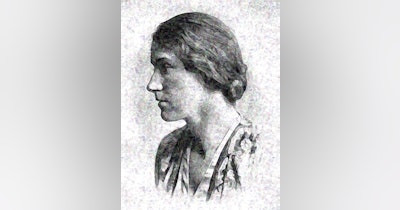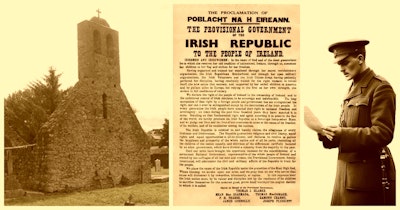Robert Emmet in profile by John Comerford
Robert Emmet was born in Dublin on the 4th of March, 1778. He was the 17th child of Dr Robert and Elizabeth Mason. Despite the family’s prosperous circumstances only four of the seventeen children would reach adulthood
Robert would proved to be be precocious and seems to have inherited his physician father’s republican politics. At age 15, the son entered Trinity College where he soon established a reputation in the institutions debating society. He joined the proscribed United Irishmen sometime in 1796 and while he did not participate in any of the subsequent fighting of the rebellion two years later, he was expelled from Trinity for his affiliation.
Have you listened to our podcast? Get the latest on our Episode Page.
In 1800, Emmet traveled to Paris in support of mission requesting French intervention in Ireland. While the rebels managed to gain an audience with Napolean, their efforts were not met with a favorable hearing. Despite the failure, Emmet returned to Ireland in 1802 to plan a rebellion.
Emmet's plan, reliant on a surprise attack and public support, was flawed from the outset. Lacking sufficient organization and coordinated action from other regions of Ireland, the uprising quickly faltered. On July 23rd, 1803, a small group of rebels led by Emmet clashed with British forces in Dublin. The rebellion was swiftly quashed, resulting in heavy casualties among the rebels and civilians.
Despite the failed uprising, Emmet managed to escape initially. However, he was captured shortly afterward and condemned to death for treason. Facing execution, Emmet delivered a powerful and emotional speech before the court, expressing his unwavering belief in Irish liberty and defending his actions. His famous closing words, "Let no man write my epitaph until my country takes her place among the nations of the earth," continue to resonate as a powerful call for Irish independence.
Robert Emmet replying to the verdict of high treason
Following his execution on September 20th, 1803, Robert Emmet became a martyr figure in Irish nationalist discourse. His youth, idealism, and stirring final words resonated deeply with the Irish public, solidifying his place as a symbol of the ongoing struggle for self-determination.
For a more detailed account of Robert Emmet's life, please visit the Dictionary of Irish Biography


















